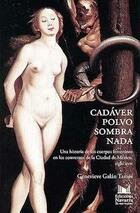The bodily experience, despite being lived individually, is presented as a social experience in numerous investigations, to the extent that each society creates and constructs its own way of thinking and relating to bodily stimuli. From a historical perspective, it can be stated that there is no intelligible and universal grammar of the human body and its matter that allows it to be signified and appropriated in a univocal manner. The way in which each subject and society understands and lives their body has been transformed. Paraphrasing Rafael Mandressi, the “body” as an object of knowledge is an artificial object, never natural. Built like a large mosaic, Corpse, dust, shadow, nothing aspires to outline indicators that help us think about how the female body was constructed in New Spain throughout the 17th century. History—thought with De Certeau—is a recomposition of vestiges that...read more
All book titles by this author
|
Title |
Price | ||
|---|---|---|---|
|
|
Cadáver, polvo, sombra, nada Author: Genevieve Galán Tamés Publisher: Navarra |
$300.00
10%$270.00 |
Shopping cart
Loading cart
Important notices
|
|
Recordando a André Rouillé: Su legado en la fotografía André Rouillé 1948 - 2025 |
|
|
Libros de filosofía y co. Disponibles en Librería Herder |
|
|
Revista Filosofía & Co. nº 9 Nueva revista de filosofia divulgativa y actualidad |
|
|
"Espacios de la filosofía" - Mauricio Beuchot - Novedad Herder México |
|
|
Revista Filosofía & Co. nº 8 Nueva revista de filosofia divulgativa y actualidad |
Pay safely with:


In the webshop
New
|
|
Revista Filosofía & Co. No. 15 70591 $200.00 -0.00% $200.00 |
|
|
El bestiario de Michel Foucault 70404 $749.00 -15.00% $636.65 |
|
|
La fuerza de los fuertes 70405 $519.00 -15.00% $441.15 |
|
|
Su Majestad 70410 $319.00 -15.00% $271.15 |
|
|
El arte de la fantasía 70407 $759.00 -15.00% $645.15 |
In the press
Promotions
|
|
Panorama A1.1, Deutsch als Fremdsprache kursbuch 37337 $235.00 -35.00% $152.75 |
|
|
Panorama A1.1, Deutsch als Fremdsprache Übungsbuch 36726 $235.00 -35.00% $152.75 |
|
|
Diccionario de términos filológicos 70241 $900.00 -25.00% $675.00 |
|
|
Prosa y poesía. Homenaje a Gonzalo Sobeja 70242 $1,755.00 -25.00% $1,316.25 |
|
|
Lingüística española aplicada a la terapia del lenguaje 70239 $300.00 -25.00% $225.00 |














